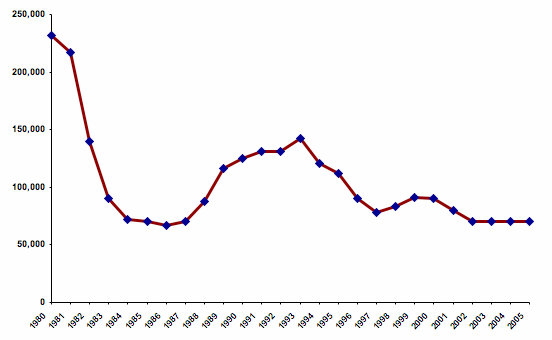What is a Refugee?
The United Nations Convention and Protocol defines <1> a refugee as:
Someone who flees his or her country because of a well-founded fear of persecution on five specific grounds:
Nationality
Race
Religion
Political Opinion
Particular Social Group
Refugees and U.S. Policy – A Brief History
The U.S. did not adopt the U.N. definition of "refugee" until passing the Refugee Act of 1980. Prior to that, refugee status was only granted to those fleeing communism. In the 40s and 50s, after World War II, the U.S. took in about a million displaced persons (DPs) from the Soviet Union and Eastern Europe who would have otherwise been repatriated into countries under communist rule. In the 60s, Cubans fleeing Fidel Castro’s regime fled to the U.S. In the 70s, Russian Jews were admitted, followed by Southeast Asians.<2>
Hundreds of thousands of Vietnamese, Laotians, and Cambodians were granted refugee status in 1974, after the collapse of their U.S.-backed governments. Southeast Asians, along with the Cubans and Haitians, were the first largely visible refugee population to enter the U.S. en masse. Whereas previously admitted “displaced persons” trickled in over several decades and were perceived to have been easily absorbed into the American mainstream, Southeast Asians had a noticeably more difficult time assimilating.<3>
After this large influx, the U.S. tightened its refugee admittance policy, declining refugee status to Salvadorians and Guatemalans in the 80s. By the 90s, refugee inflows were becoming more widely distributed from around the globe.<4>
Yet every war has its aftermath, and the origins of the U.S. refugee population reflect this fact. A large group of Bosnians came to the U.S. in the 90s, followed more recently by groups from Africa and the Middle East.<5>
 |
Graph of Annual Refugee Resettlement Ceilings, 1980 - 2005 (Source US Department of State, via Migration Information Source) |
=====
<1> David W. Haines, “Refugees,” in The New American: A Guide to Immigration since 1965, ed. M. C. Waters and R. Ueda(Cambridge, MA: Harvard University Press, 2007), 58
<2> Ibid., 57
<3> Ibid., 57-58
<4> Ibid., 59
<5> Amy Carrington, interview by author, Cambridge, MA, November 14, 2007